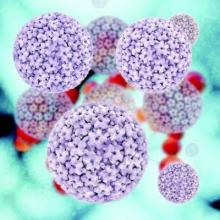The Centers for Disease Control and Prevention’s Advisory Committee on Immunization Practices voted to support proposed recommendations for use of the recently licensed 9-valent human papillomavirus vaccine.
At a meeting on Feb. 26, members of ACIP voted 14-0 with one abstention, to support the draft wording for HPV vaccination, which has been modified to account for the availability of the 9-valent HPV vaccine (Gardasil-9), licensed by the Food and Drug Administration in December 2014. The five additional high-risk HPV types – 31, 33, 45, 52, and 58 – included in the 9-valent vaccine are associated with about 20% of cervical cancers, and are not included in the quadrivalent vaccine (Gardasil) that was approved in 2006.
The age groups, as proposed by ACIP’s HPV work group, are the same as currently recommended for HPV vaccination: females and males aged 11 or 12 years (but the series can be started at age 9 years); and females aged 13-26 years and males aged 13-21 years, who have not been vaccinated or have not completed the three-dose series. The statement that males aged 22-26 years may be vaccinated, as currently recommended, also is included.
For males over 15 years, this would be off-label use since the 9-valent vaccine is licensed in males aged 9-15 years, but immunogenicity data in males aged 16-26 years has been presented to ACIP and has been submitted to the FDA, Dr. Lauri Markowitz of the CDC’s National Center for HIV/AIDS, Viral Hepatitis, STD, and TB Prevention (NCHHSTP), said at the meeting.
The draft also adds to the previous recommendation that females can be vaccinated with the bivalent vaccine, the quadrivalent vaccine (as long as it available), or the 9-valent vaccine; and males can be vaccinated with the quadrivalent vaccine (as long as it is available) or the 9-valent vaccine.
Other proposed modifications include wording regarding interchangeability of the vaccines, which no longer includes the statement that ACIP recommends that females complete the HPV vaccination series with the same vaccine product, whenever possible.
Instead, it states that when providers do not know which vaccine the female patient received previously, or does not have it available, “or are in settings transitioning” to the 9-valent vaccine, “for protection against HPV 16 and 18, any HPV vaccine product may be used to continue or complete the series for females.” For males, the statement now says that the quadrivalent or the 9-valent vaccine “may be used to continue or complete the series.” (Previously, it said that only the quadrivalent vaccine was licensed in males.)
Dr. Markowitz said that no change in HPV vaccination during pregnancy has been proposed and that a new pregnancy registry for the 9-valent vaccine has been created. (HPV vaccination is not recommended during pregnancy.)
The HPV work group also is considering use of the 9-valent vaccine in people who have completed the HPV vaccination series, which will be presented at the next ACIP meeting in June 2015.
Gardasil 9 was licensed in December 2014, for females aged 9-26 years, and males aged 9-15 years for the prevention of cervical, vulvar, vaginal and anal cancers caused by HPV types 16, 18, 31, 33, 45, 52 and 58, and for the prevention of genital warts caused by HPV types 6 or 11. When it was licensed, the FDA said that the 9-valent vaccine has the potential to prevent approximately 90% of cervical, vulvar, vaginal, and anal cancers.
A representative of the manufacturer, Merck Sharpe & Dohme, said at the meeting that the 9-valent vaccine is commercially available and that the company is confident that there will be an adequate supply of both the 9-valent and the quadrivalent vaccine.
The bivalent HPV vaccine, Cervarix, was licensed in 2009 for females only and protects against HPV types 16 and 18. More than 98% of the HPV vaccine used in the United States has been with the quadrivalent vaccine, according to Dr. Markowitz.


